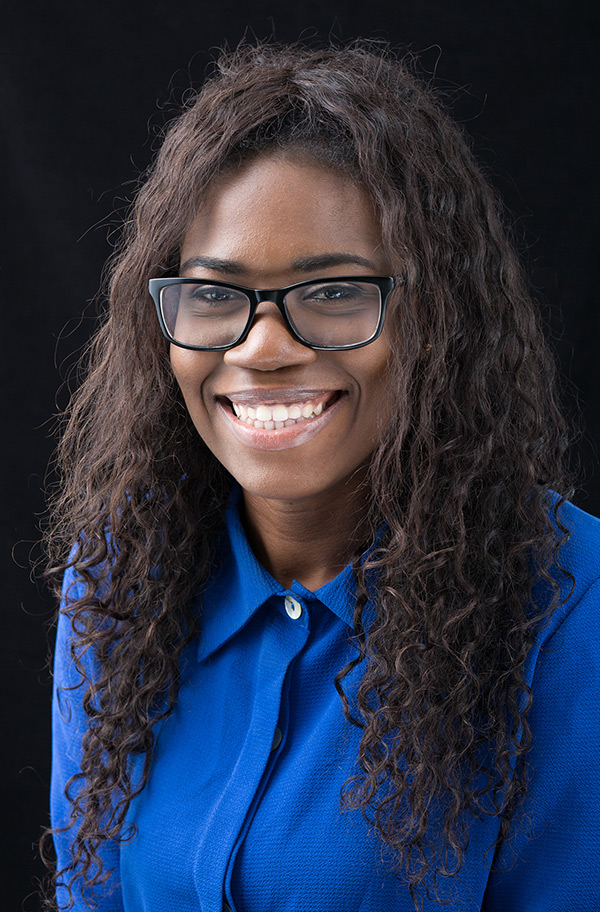BOONE, N.C.—Sarah Mbiki is an advocate for the role academic and professional student clubs play in the Appalachian State University experience. The senior computer science major credits her experience in the Women in Computer Science club for providing her with support and mentorship opportunities as she completes a challenging major and prepares for work in a field that is traditionally male-dominated.
Mbiki, a senior from Matthews, said the club began as an informal support group for female computer science majors. Women comprised only 11 percent of students majoring in computer science in 2015, according to Dr. Rahman Tashakkori, a mentor for the club and the university’s Lowe’s Distinguished Professor of Computer Science.
The group became a formal student club in 2014, the same year Mbiki formally declared her major as computer science. The coursework, she said, is demanding, and Mbiki recalls initially considering a less intimidating major. The Women in Computer Science club provided her with the support she needed to stick with her decision.
“I didn’t know anyone, and the club helped me connect with other females in the major and with the professors. I think if the club was never discovered, I wouldn’t have remained in the major. Being a part of the club helped me form study groups, which improved my academic performance,” Mbiki said.
Mbiki went from club member to club president. Under her leadership, club members have taken on projects with area school youths. Club members have refereed robot competitions and demonstrated robots navigating through a maze for local schools.
Club members have also stepped up their attendance at events, in particular Pearl Hacks, an all-female hackathon event held at the University of North Carolina at Chapel Hill designed to encourage women to pursue their interest in technology and innovation.
“I always take the club to the event because it’s an empowering moment to stand in a room full of hundreds of women in (computer science). There are many positive role models. It’s always inspiring to hear from someone that was once in your position and has overcome struggles you’re facing and is now working in an amazing place,” Mbiki said.
Discussions about career options, student projects and opportunities to meet role models add value to the student club experience, said Mbiki, and student club projects with area schools allow club members to develop good teamwork, build communication skills and learn to utilize available resources. Mbiki said it is essential to identify opportunities that will be most helpful to the club members and relevant to the club’s purpose.
“Our club mission is to support and encourage women who are in technical majors, give them opportunities to learn outside the classroom, and build a strong supportive community,” she said.
Involvement in this and other clubs, said Mbiki, “improves your leadership skills and you learn things that aren’t taught in the class. I’m big on student leadership and service learning.”
Mbiki’s professional goal is to conduct research related to medical advancements made through the use of technology. In addition to her coursework and club activities, she has found additional opportunities to find mentors and improve her research skills.
Last summer, she attended a National Science Foundation (NSF)-funded Research Experience for Undergraduates (REU) program, where she met female computer scientists and developed a research project.
“Our research project sought to create a machine learning program that could determine if a patient was exhibiting less RETT [syndrome] related behavior while on clinical drugs,” Mbiki said.
“Overall, my experience was empowering, and it has certainly introduced me to a lot opportunities for post-graduate programs.”
According to Tashakkori, women are underrepresented in the field of computer science. “While women receive over half of bachelor’s degrees awarded in the biological sciences, they receive far fewer in the computer sciences (17.9 percent), engineering (19.3 percent), physical sciences (39 percent) and mathematics (43.1 percent),” Tashakkori said.
Dr. Alice McRae, an associate professor in the Department of Computer Science, is the advisor for the Women in Computer Science club. The group meets on alternate Wednesdays and is open to computer science majors and other interested students.
About the Department of Computer Science
Appalachian’s Department of Computer Science provides a rigorous, high-quality education that prepares students for the computing industry or graduate education. It offers a Bachelor of Science degree in computer science, which is accredited by the Computing Accreditation Commission of ABET, and a Master of Science degree in computer science.
About Appalachian State University
As a premier public institution, Appalachian State University prepares students to lead purposeful lives. App State is one of 17 campuses in the University of North Carolina System, with a national reputation for innovative teaching and opening access to a high-quality, cost-effective education. The university enrolls more than 21,000 students, has a low student-to-faculty ratio and offers more than 150 undergraduate and 80 graduate majors at its Boone and Hickory campuses and through App State Online. Learn more at https://www.appstate.edu.
What do you think?
Share your feedback on this story.



![How NCInnovation Is Rethinking Economic Development in North Carolina [faculty featured]](/_images/_posts/2026/02/rethinking-economic-development-600x400.jpg)








